Jennifer Casa-Todd is a Teacher-Librarian in Aurora, Ontario Canada, and author of the book, Social LEADia, published by Dave Burgess Consulting. Before this, she spent six years at the District level as a Program Resource Teacher for Literacy and Literacy Consultant, respectively.
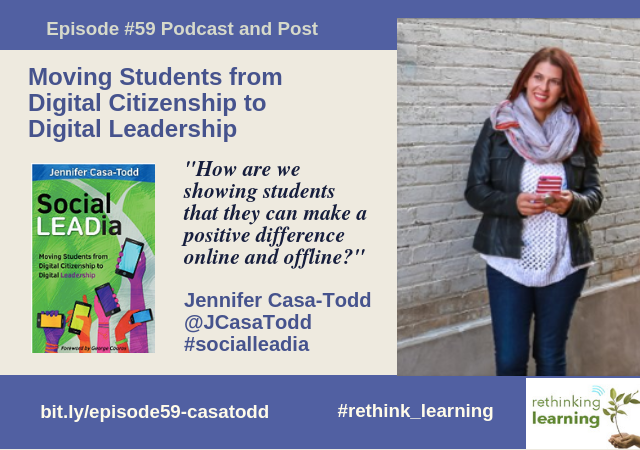
Podcast: Play in new window | Download
Subscribe: Spotify | TuneIn | RSS
Jennifer guest-hosted the #rethink_learning Twitter chat that I co-host with Shelly Vohra @raspberryberet3. I was able to learn so much about Jennifer in the chat along with reading her book and connecting to her on social media. I am so honored that we had this conversation and even learned some things about her that I didn’t know. I hope you take the time to enjoy her story!
You and your family
I am a mom and wife. My husband, Stewart, is a principal. We have two children, my daughter, Sydney, just started university in a marine biology program. That is what she’s always wanted to do since she was a little girl. My other daughter, Kelsey, is in grade 11.
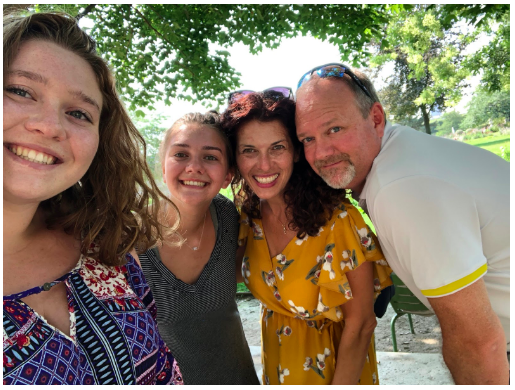
I loved being on Parent council and was for over 10 years beginning when Sydney was in Kindergarten. I even ended up being co-chair of the council because I wanted to be involved and have never looked back since. I had nothing but positive interactions with other parents that are now lifelong friends that I developed as a result of being in the council. We definitely need to create an environment where we are not judging each other. This environment is where we can be there to support each other.
CUEByte Speaker:
What is what like for you as a student
Here is something a lot of people don’t know about me. When I entered school when I was four years old, I didn’t speak a word of English. I spoke Sicilian. No one could understand me so they chalked it up to a lack of mental ability. The first formative years in my learning were very tough. I was a nonreader. Learning English while learning to read and all those things that many people had already when they come to school. It’s kind of ironic that I’m a teacher/librarian because no one read books to me when I was young. When I started to learn to read, it opened a whole new world for me. In elementary school also, I was severely bullied. I was cross-eyed, had very thick glasses, and had several operations. I was called four eyes. My mom made my clothes because we didn’t have a lot of money.
 Those were very, very challenging years. Books were my reprieve because I didn’t have any friends. I lacked self-esteem so I made a lot of poor choices in high school. As a student, I realized I needed to get good grades so school became important to me. In grade 11, I had a teacher, James Stewart, who absolutely enthralled me because he was so passionate about literature. At one point, I had to make a choice between becoming a teacher or expand my part-time job at McDonald’s that I really enjoyed because of the social aspect. I was offered a company car, benefits, and the opportunity to go to the Hamburger University in Chicago. That’s when I decided that I wanted to be a teacher. I wanted to give opportunities to kids who are disadvantaged in a way that I kind of felt I was. I was a good student from then on and went to university and teacher’s college.
Those were very, very challenging years. Books were my reprieve because I didn’t have any friends. I lacked self-esteem so I made a lot of poor choices in high school. As a student, I realized I needed to get good grades so school became important to me. In grade 11, I had a teacher, James Stewart, who absolutely enthralled me because he was so passionate about literature. At one point, I had to make a choice between becoming a teacher or expand my part-time job at McDonald’s that I really enjoyed because of the social aspect. I was offered a company car, benefits, and the opportunity to go to the Hamburger University in Chicago. That’s when I decided that I wanted to be a teacher. I wanted to give opportunities to kids who are disadvantaged in a way that I kind of felt I was. I was a good student from then on and went to university and teacher’s college.
Coffee with a Geek Interview with Jennifer Casa-Todd https://youtu.be/xT2pBrKihvU
Your journey as an educator
I started teaching at a young age, 23, and the first class I taught was a grade 12 media literacy class. I wasn’t much older than some of my students. In fact, one student was 21 who asked me to the prom. That didn’t happen. I also taught ESL, English, religious education, cooperative education, and special education all at the high school level at a variety of different schools. When I was at St. Theresa’s where I taught English and Special Education, an opportunity for a program resource teacher came up and worked at the district level for about six years. That was an amazing opportunity because I worked with a small but mighty team, so we did everything. I dabbled in literacy, assessment, and new teacher development. We rolled out a 21c technology learning program for our teachers at all of the 128 schools in our board. I got to work with some incredible K-12 educators.
After six years, I really missed the classroom and being able to implement ideas I had for the students. Then I worked with some teacher/librarians in my district who were all incredible and realized this was what I could do. It is very similar to what I was doing at the district level, but it would be in a school. I applied twice and the second time was successful and have been here at Cardinal Carter Catholic High School in Aurora, Canada for three years. My first year was very tough though because I incurred a concussion on October 31st and then was off for the rest of the school year with a 10-month recovery. Now I’m feeling blessed to be almost 100% recovered.
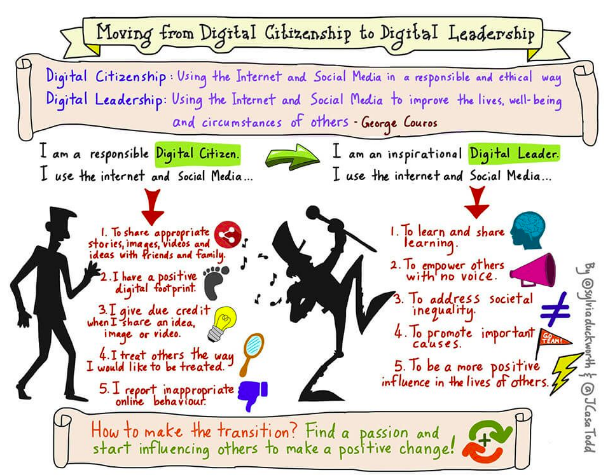
Why does digital leadership matter?
Digital leadership is actually a concept I borrowed from George Couros (@gcouros) who is an incredible mentor in my life. I tell this story in the beginning of my book. My daughter was on an interview and asked “what social media are you on and what will I learn about you if I go there?” When I reflected on this question, I realized I did not mentor my own child when it came to social media. Rather than showing her what she could do online, I prevented her from doing things and thought I was controlling her use online. Actually she figured it out how to get around the safe search I had put on her phone. It was George’s definition of digital leadership that using the vast reach of technology and social media to improve the lives and the circumstances of others that had a great impact on me.
What if we change our stance and our students’ stance toward social media was on digital leadership? What might that look like?
In my journey, not every adult was like me. There were so many students who showed leadership online and were being supported around some of their passions and ideas by adult mentors not always teachers. There is a chasm when students know there is a possibility for doing good online where so many students go online only for entertainment. Since 2014, I have seen incredible changes in how we are listening to student voice, the ability to mentor students with class accounts, and the growing reach of students on social media. I continue to celebrate and share the students who are doing positive things online and shine a light on them. The more all of us do this, the better off we will be.
“Social media is social currency for young people.”
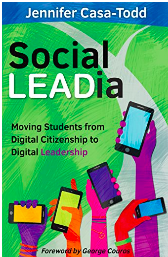 How did you come up with the title, Social LEADia?
How did you come up with the title, Social LEADia?
Coming up with a title for a book is the hardest thing ever. I maybe threw out a thousand possibilities and asked my PLN (Personal Learning Network) for support. I remember texting George @gcouros on a regular basis where we were both share many titles and he came up with Social LEADia. That was it! We both knew it. It was a play on words. Social Media, Social LEADia kind of rhymes and I’m talking about digital leadership. So that’s how the title was born.
Check out the companion for my book, Social LEADia at https://www.socialleadia.org/ that includes Flipgrids that connects to each of the chapters along with some of the students’ stories.
Listen to Jennifer talk about her book here, https://youtu.be/LWjGVD5bL7Y
Why does social media need to be a part of teaching and learning today?
Because it is part of our world. I know we are fearful, but social media is a literacy, reading and writing the world. Stanford University did a study in 2017 showing that most middle school students couldn’t tell the difference between a credible news source and one that was sponsored. When I consider how digital citizenship can be taught in context with a class account really being able to show kids that social media is a place to learn and share their learning, to empower others, and to have a powerful influence on others. We are doing that mentoring for them by showing them what appropriate use looks like in our classrooms. Digital citizenship lessons can’t be just one class at the beginning of school, it needs to be an ongoing conversation.
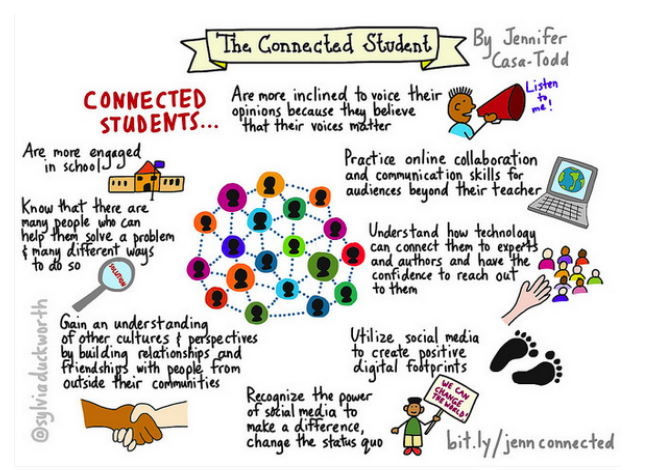
Banning mobile devices and saying that this is not our problem is easier for schools. We absolutely have a distraction problem with our students. There are always a few students who pull out their phones when it is not appropriate. I think self-regulation is huge. To me, it’s an inequity issue. All of us including parents need to emphasize effective media use. If we don’t, then who is teaching our kids how to do this? Some of my kids have told me that they have been on YouTube for over a decade. This generation of kids has probably been on social media entirely by themselves without adult mentors. I worry about the huge chasm between the kids that have mentors and the kids that don’t. It’s complicated but we just have to engage in courageous conversations to figure out how this is going to work. There are many positives and so many ways to learn using these powerful tools in their pockets. If we’re not showing them as educators how to use them to learn, who are showing them?
****
This is Barbara. Make sure you listen to the entire podcast. Jennifer explains about parents’ views on social media and how to build communication in and out of the school using social media. She puts on workshops for parents who have tons of questions. Jennifer has opened the door for great conversations that need to happen to everyone in the school community. She even created with BreakoutEDU a game for Social Leadia as a team building, book study.
****
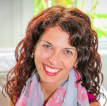 Jennifer Casa-Todd is a Teacher-Librarian in Aurora, Ontario Canada, and author of the book, Social LEADia, published by Dave Burgess Consulting. Before this, she spent six years at the District level as a Program Resource Teacher for Literacy and Literacy Consultant, respectively.
Jennifer Casa-Todd is a Teacher-Librarian in Aurora, Ontario Canada, and author of the book, Social LEADia, published by Dave Burgess Consulting. Before this, she spent six years at the District level as a Program Resource Teacher for Literacy and Literacy Consultant, respectively.
Jennifer works with teachers from Kindergarten to grade twelve in practically every subject area to integrate technology in the classroom, to support literacy, assessment, and differentiation, and to promote twenty-first-century competencies. She also had the privilege to write curriculum for the Ministry of Education of Ontario’s 21st Century Learning office as well as the Catholic Curriculum Corporation and is currently studying at the University of Ontario, Institute of Technology with a focus on social media in education and Digital Citizenship.
Jennifer has been the co-chair as well as an active member of the Parent Council for over a decade, bringing parent and school communities together for a variety of issues. I have also worked closely with the Bully-Free Alliance of York Region with whom I initiated a panel discussion, “Fears, Cheers, and Unclears: Parenting in a Connected World.” She is also the lead organizer for the Digital Citizenship Summit, Canada happening in Fall of 2018.
Jennifer is the author of Social LEADia: Moving Students from Digital Citizenship to Digital Leadership It is full of examples of students who are leveraging social media for good, and the teachers who are empowering them to do so.
Contact info for Jennifer
Websites: https://jcasatodd.com, https://www.socialleadia.org/
Twitter: @JCasaTodd #socialleadia
Facebook: https://www.facebook.com/socialLEADia/
Sketchnotes by Sylvia Duckworth @sylviaduckworth
“We have banned and blocked social media for over a decade, and we are not exactly happy with the result. It’s time for a new approach.”
******
Interested in checking out more of the Rethinking Learning podcasts and reflections, click on the podcast tab at the top, the logo below, or go to https://barbarabray.net/podcasts/
For more information about Barbara’s new book, Define Your WHY, go to this page or click on the image of the book for resources, questions, and links.








[…] Moving Students from Digital Citizenship to Digital Leadership […]
[…] Episode #59: Moving Students from Digital Citizenship to Digital Leadership with Jennifer Casa-Todd […]
[…] Episode #59: Moving Students from Digital Citizenship to Digital Leadership with Jennifer Casa-Todd […]
[…] Episode #59: Moving Students from Digital Citizenship to Digital Leadership with Jennifer Casa-Todd https://barbarabray.net/2018/12/21/moving-students-from-digital-citizenship-to-digital-leadership-with-jennifer-casa-todd/ […]
[…] the do’s not the DONT’sReading: Digital Citizenship is the New CitizenshipPodcast: Moving Students from Digital Citizenship to Digital Leadership with Jennifer Casa-ToddMultimedia: Created using […]